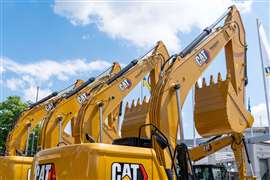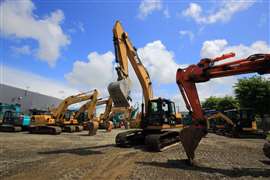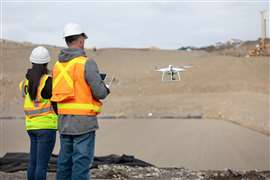Richard Dolman – Learning all the time
18 February 2021
A few hours before this interview takes place, British contractor AR Demolition’s managing director Richard Dolman sends an email to D&Ri. Nothing unusual there, except it details a near miss on a job site a couple of weeks earlier.
He is keen for other people to know about it, so it can form the basis of that overworked but – in this case – true phrase, a lesson learned.
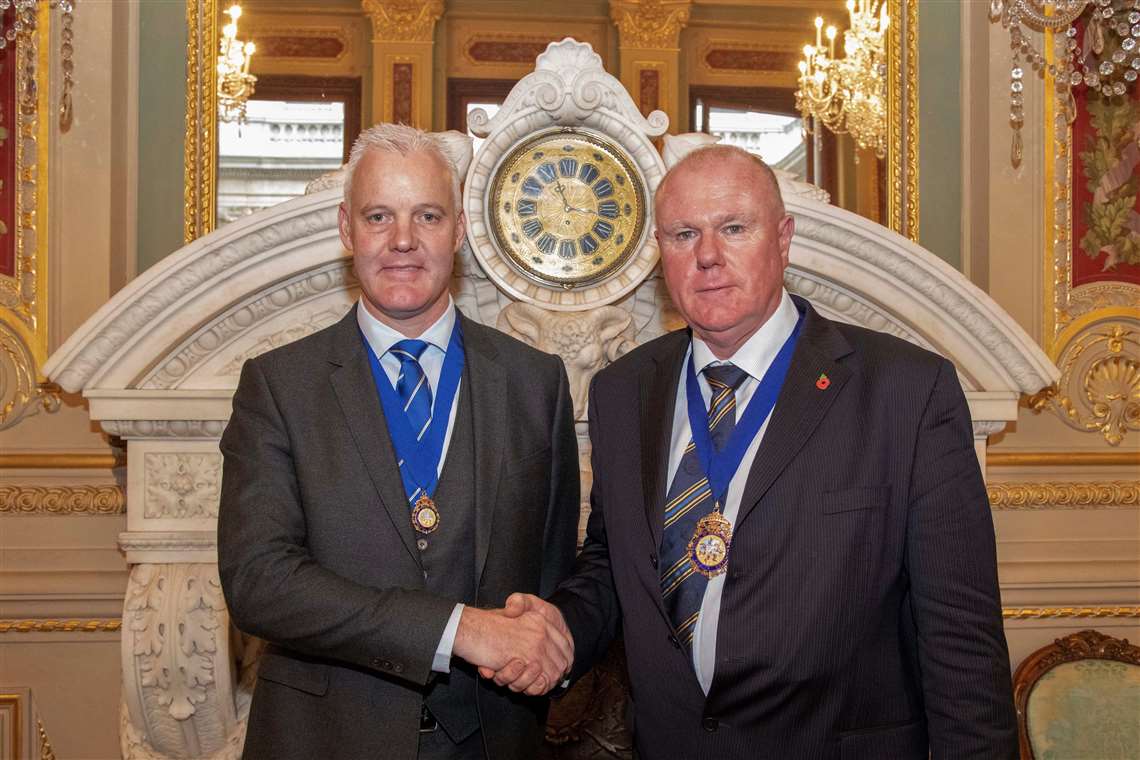 Richard Dolman (on left) with his predecessor as president of the United Kingdom’s Institute of Demolition Engineers, Gary Bishop
Richard Dolman (on left) with his predecessor as president of the United Kingdom’s Institute of Demolition Engineers, Gary Bishop
The National Federation of Demolition Contractors, the trade association for companies like AR Demolition, is already aware of it. So too is the Institute of Demolition Engineers. The IDE is the leading academic entity for individuals in the sector, the body of which he became president two months earlier. It is the group of people to whom he gave an opening – if virtual – presidential address. In it, he said that the institute, and the industry, needed to go forward on a basis of openness, trust and sharing news – positive or otherwise – for the greater good. Within a matter of weeks, he is already proving as good as his word. In February he will chair his first Council of Management meeting as president.
For Richard, putting this kind of detail into the public domain is nothing new.
“I have a bit of a reputation for sharing lessons learned. I first did it about eight years ago, and I got criticism from people asking why I wanted to air my dirty laundry in public. Now the type of criticism I get is that I have only done it because of the power of social media. Don’t get me wrong, I am not going to come out share every single incident because there is no need, some of them are too basic, but when I think there is something the industry genuinely can learn from, then I will share it. And I’m hoping that people will see it’s not a bad thing to do that and they will do the same. On the back of this incident, we had a safety meeting this afternoon and we have a few ideas about what procedures we can put in place that hopefully will massively reduce the chances of it happening again.
“I read a book a few years ago about ‘black box thinking’. It said the aviation industry was way ahead at sharing lessons learned; demolition was somewhere towards the bottom. I’m trying to get it nearer to the top.”
Invited to join IDE’s Council of Management
Richard never thought of becoming president when he joined the IDE over a decade ago, calling the decision “a way to put something back into the industry.” Significantly, he can trace his IDE history through the people who have had the top job before him. It spans six complete two-year terms and the names – Dr Terry Quarmby, John Woodward, Steve Jack, Duncan Rudall, David Darsey and most recently Gary Bishop – sound like a who’s who of demolition. Now, after serving as vice-president, it is Richard’s turn.
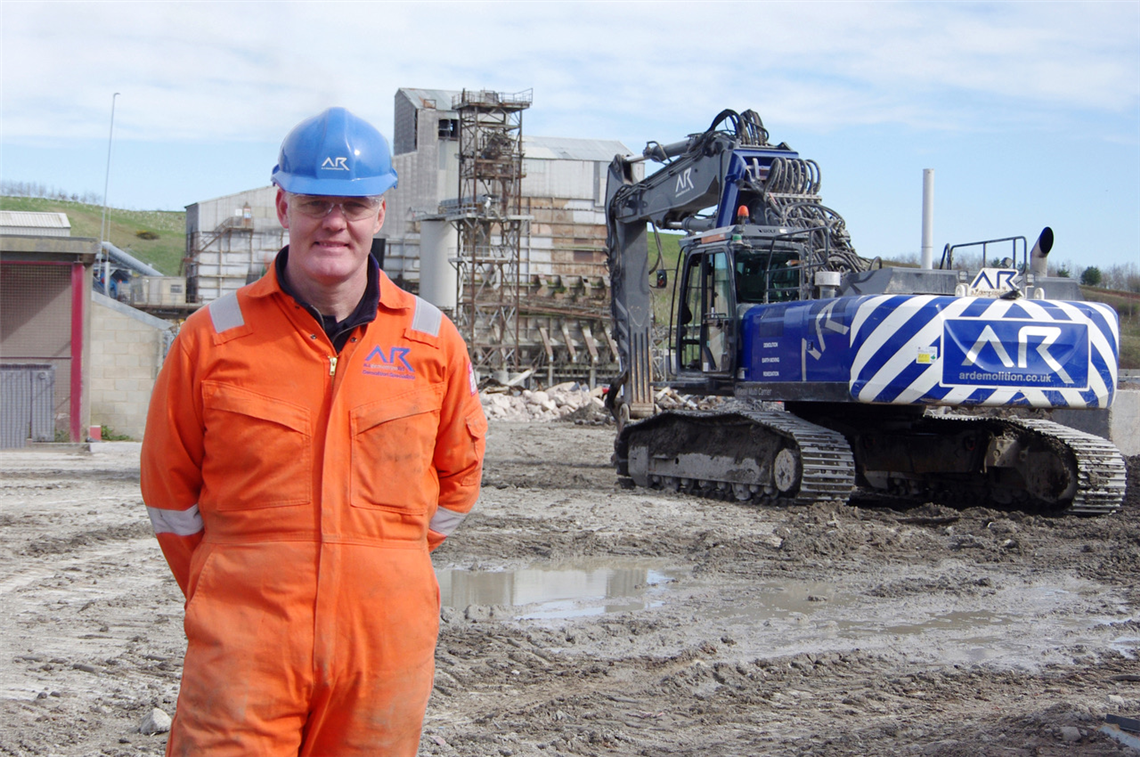 Richard Dolman on site with AR Demolition
Richard Dolman on site with AR Demolition
“I just became a normal member of the IDE, and pretty early on I got asked if I was interested in sitting on the Council of Management. I just thought ‘well, why not, it would be nice to be involved’. So I became a Council of Management member, I suppose at a very junior level, and got involved in more and more things.”
The biggest single thing has proved to be the degree qualifications in demolition management that the IDE offers in conjunction with the United Kingdom’s University of Wolverhampton, which has taken up much of the past six years of Richard’s life, firstly as part of the discussions that led to them becoming established, more recently as a Master’s Degree participant. At the time of the interview, his dissertation has just been submitted.
“I believe the demolition management degrees are exactly what the IDE stands for. Education, learning, professionalising engineering. I see bettering our educational offering as absolutely the spearhead of everything the IDE means. Everyone is on a level in the IDE. It doesn’t matter if you are the CEO of a half a billion-pound demolition company or whether you are a site manager for a firm that turns over two or three hundred thousand a year. That’s the beauty of it, that everyone is on the same page.”
Pressing the reset button with AR Demolition
Having spent the immediate past juggling the IDE vice presidency, academic study and the day job at AR Demolition, no one can say Richard has come to his current situation unprepared. And what would have been challenging at the best of times took an extra dimension from March 2020 onwards when demolition had to face up to Coronavirus.
For AR Demolition, the year had got off to a less than promising start anyway, with redundancies announced in February despite some high-profile projects in previous years. But the 12 months since, in Richard’s view, have been positive.
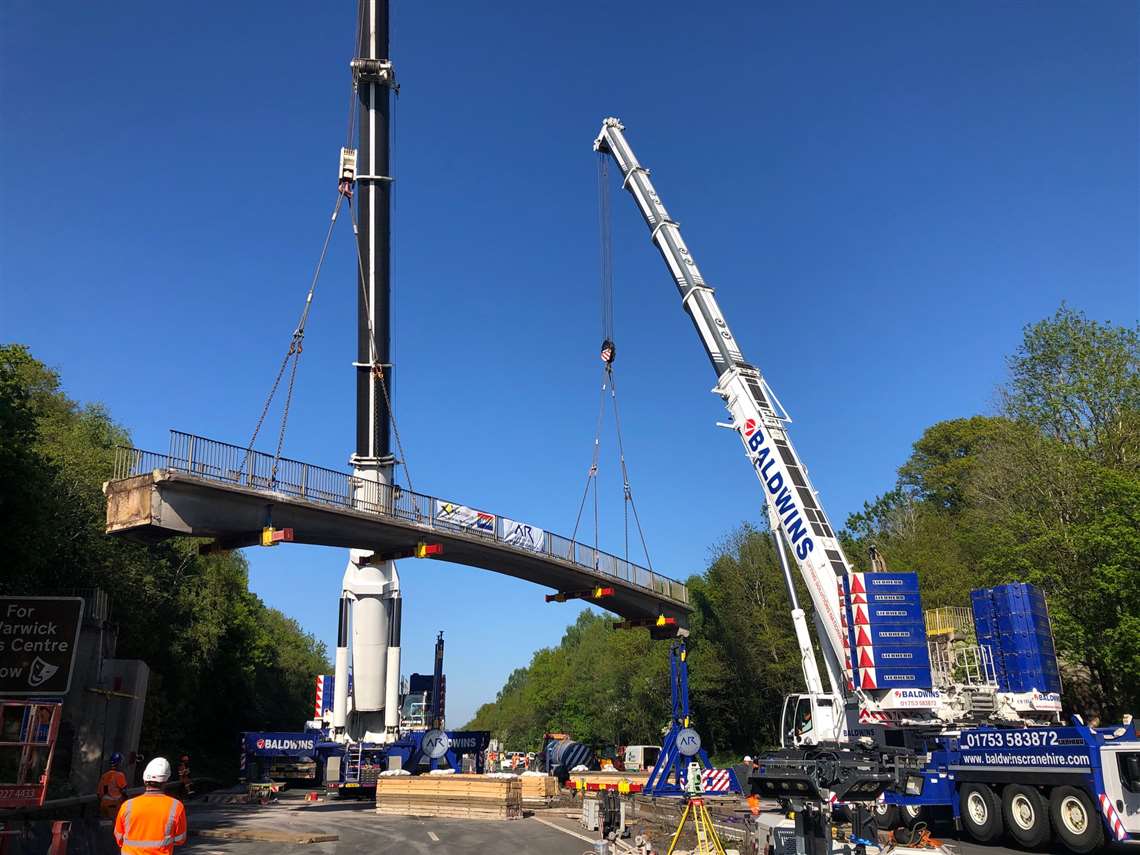 AR Demolition performs a technical bridge lift, April 2020
AR Demolition performs a technical bridge lift, April 2020
“We were delighted with the 2020 that we had. There is no secret, we had a bit of a rough time in the past few years and it has taken us a long time to press the reset button. But we believe we pressed it at the start of last year and even though the pandemic hit, 2020 looks like it has been a good year for us. I’m satisfied with the order book and the way things are coming in for 2021. The industry looks a little bit more competitive but we will see what happens.
One highlight of the year was the project at Croft Quarry in the English midlands where the company used “kick and cut” explosive technology developed by British explosive specialist Alford Technologies.
“That was very satisfying, and the work we did on the same job to winch a 100-year-old steam engine, that was amazing for many reasons. But we also took on a project to clear some buildings in the centre of Birmingham and did quite a lot of landscaping afterwards. That turned out well with a very happy client. We did a technical bridge lift as well, in April during Coronavirus, which was rewarding.
“And then we were fortunate to secure the decommissioning of a very technical precious metals refinery, with a lot of potential hazards that we were not used to as a demolition contractor and flipping things completely on their head. What I mean by that is there were materials to go away as specialist waste, but in this instance they were extremely valuable waste. We did a part remediation and the soil had been contaminated with platinum group metals worth literally millions of pounds. So whereas this would normally be an expensive headache, the mindset here was the more we can find the better, as long as we can recover it all. That job is drawing to a close now…”
Going back to basics on the job site
Returning to lessons learned, Richard is determined to apply the same thought process to AR Demolition in a business sense.
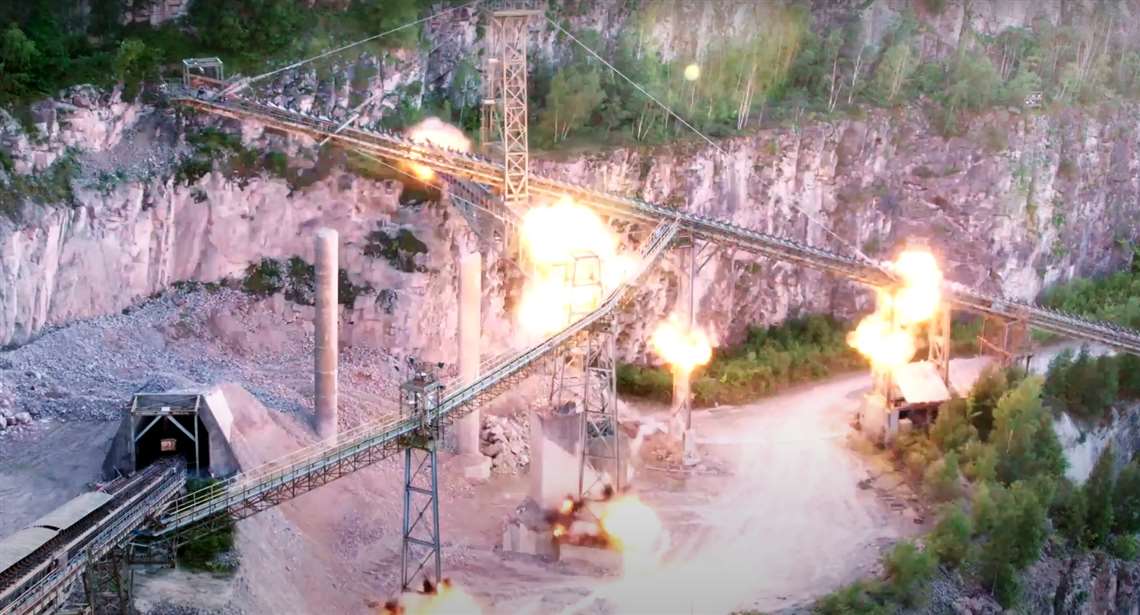 AR Demolition exploding a conveyor belt at Croft Quarry, United Kingdom
AR Demolition exploding a conveyor belt at Croft Quarry, United Kingdom
“I am very honest about it. AR got too big a few years ago, and the reason it got too big was because the skills were not out there to replicate what we were doing, so we got
into a world where we weren’t doing as well as we had, we couldn’t manage it, couldn’t deliver. I would rather be where we were before that and be good at what we do. I believe we are somewhere near that now. We have a bit more to do, but not that much, and it is like going back to basics. I’m happy for it to grow, but it will only grow by installing the right people. A lot of the focus will be on attracting people into the industry, training them, building confidence and just letting things grow organically. We exploded onto the scene a few years ago, everyone wanted us working for them and everyone wanted to work for us. It was all great, but suddenly you are not delivering what you used to deliver.
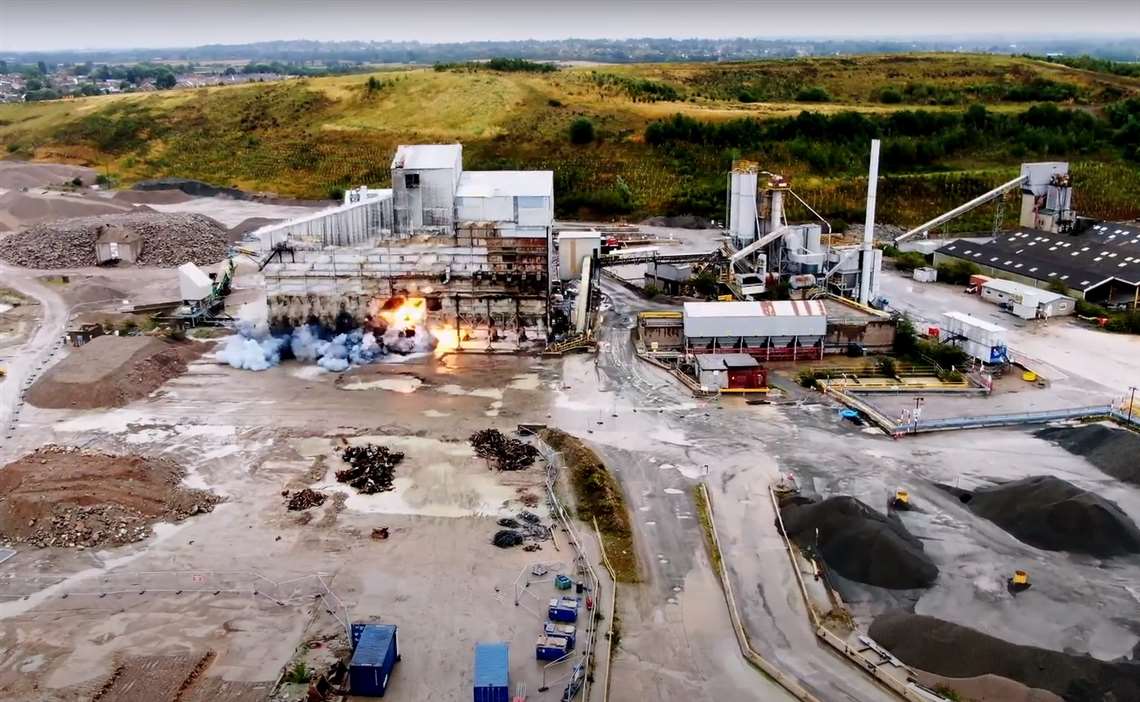 AR Demolition takes down the screen house, also at Croft Quarry, United Kingdom
AR Demolition takes down the screen house, also at Croft Quarry, United Kingdom
“Now we are being a bit more picky about what work we want to tender for. By knowing we are going for the right work with a good client, and knowing we are on a level playing when it comes to tendering, hopefully we are in a good position if we win a job.”
- Article first published in the January-February 2021 issue of Demolition & Recycling International




